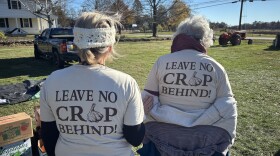Basil has been one of the big draws all summer at Dimond Hill Farm in Concord.
“We give a sprig away for every customer who buys something,” says YiannaColiandris, who works at the farmstand.
“Everyone was enjoying that, and it was absolutely thriving. It was beautiful, beautiful basil, and it tasted and smelled absolutely wonderful.”
But now customers will have to find basil elsewhere.
“This was the basil,” says Jane Presby, surveying a tenth of an acre of empty soil.
Presby, whose family has owned Dimond Hill for seven generations, says she saw signs of basil downy mildew here about a week ago.
“The leaves turn brown and get crispy,” she explains, “and once it's in it races, like anything. It's kind of like getting poison ivy: it's one little spot and then you get it all down your arm.”
Presby practices what's called Integrated Pest Management, or IPM, where a farmer uses organic and sometimes non-organic methods, but tries to be as minimal about all of it as possible. She thought about the fungicides that might work, and how much she would have to put on the basil to save it.
“This year the downy mildew came in so quickly, that I decided to just turn it under,” she says. The whole tenth of an acre was plowed back into the ground.
Downy mildew is a pathogen that only affects basil. It can handle cooler or warmer weather, as long as it's wet – like this summer. And while it can't overwinter in New Hampshire, for the last few years downy mildew spores have made their way in on northeasterly winds, and on infected basil plants grown in other states and sold here.
Becky Sideman, Vegetable and Berry Specialist at the University of New Hampshire Cooperative Extension, says downy mildew had been showing up in the state in mid-to-late summer for the last three or four years.
Sideman doesn't have the numbers yet, but knows she saw her first sample of downy mildew in late July, and by now “I've seen enough of it to assume that it's relatively common and prevalent throughout the state,” she says.
Downy mildew is a relatively new problem, first documented in the US just seven years ago, so, Sideman says, growers – and the UNH Extension – are still trying to figure out how to deal with it.
So far, we know sweet basil, the most common kind, is also the most susceptible. It's best to mix it up by growing specialty varieties like cinnamon basil or Thai basil instead.
And, says Sideman, if your basil is still healthy, pick it now.
Back at Dimond Hill, Jane Presby notified customers on the farmstand's Facebook page, explaining why there would be no more basil this summer. “No, I wasn't disappointed,” says Marilyn Donnelly, a nutrition counselor who buys fruits and vegetables here four or five times a week. Between heavy chemical use or no basil, Donnelly says Dimond Hill made the right choice.
“I applauded them for that,” she adds. “I even wrote a little note on their Facebook page about how happy I was.”
Presby says that's the silver lining here: consumers know more about, and are more involved with, how their food is grown.
Now, there are still plenty of farms where downy mildew hasn't struck, and, for those of us who want to put some pesto away, we better get moving.
For more information on basil downy mildew, and pictures, the UNH Cooperative Extension recommends this article from Cornell University.








